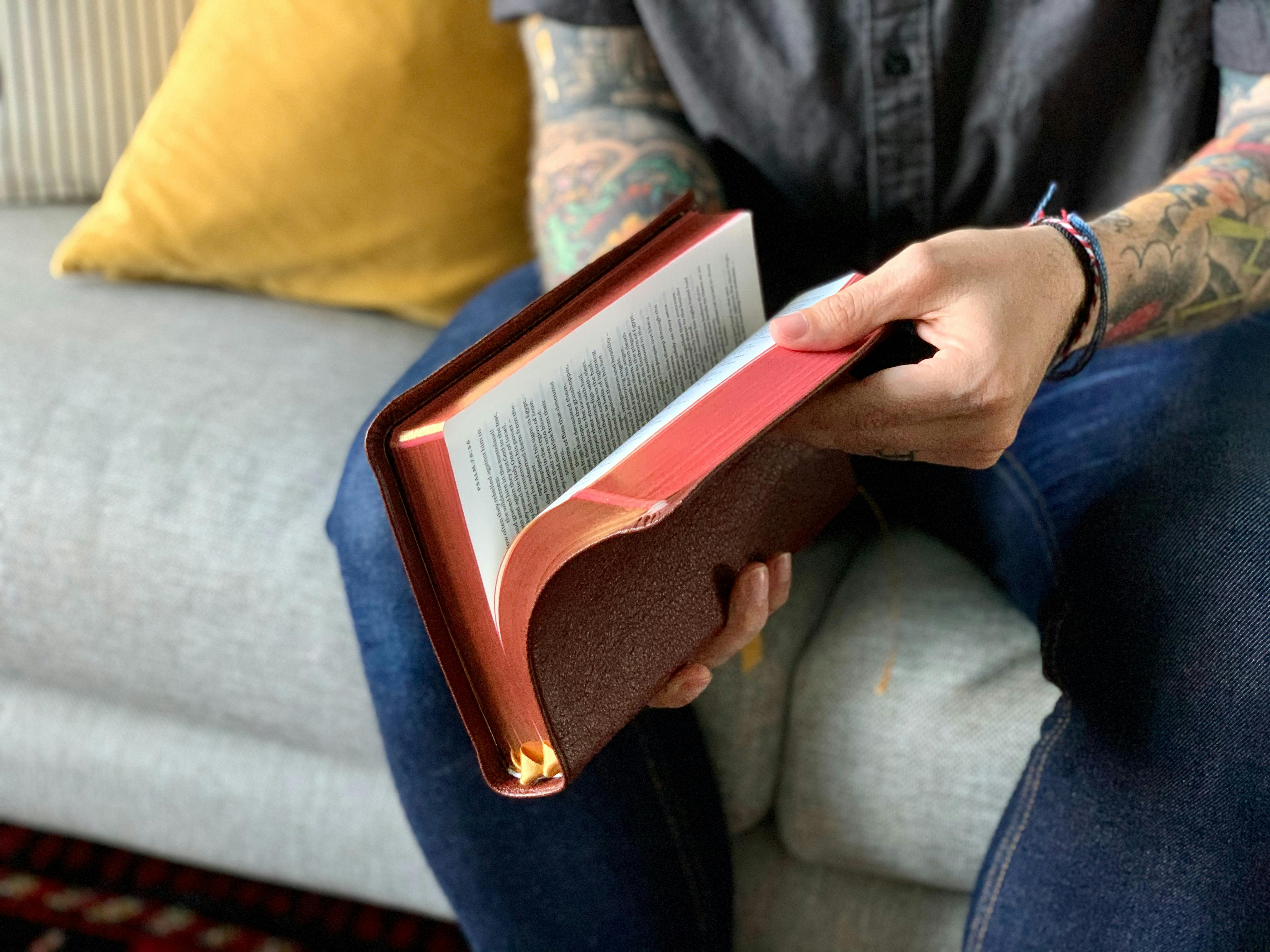Does the Bible say not to get tattoos? If you’re exploring body art while staying true to your faith, tattooat.com offers insights into the scriptural perspectives on tattoos. This article dives into what the Bible really says about tattoos, offering guidance to help you make informed decisions about tattoos and body modifications, ensuring your artistic expression aligns with your spiritual beliefs and considers modern tattoo culture and personal interpretation.
1. What Does the Bible Actually Say About Tattoos?
The core verse often cited in discussions about tattoos is Leviticus 19:28: “You shall not make any cuttings in your flesh for the dead, nor tattoo any marks on you: I am the Lord.” While seemingly straightforward, the context and interpretation of this verse are crucial. Understanding the historical and cultural background can significantly change how we apply this ancient directive today.
1.1 The Old Testament Context
Leviticus was written for the Israelites, setting them apart from surrounding cultures. Many practices forbidden in Leviticus were common rituals among pagan societies.
- Mourning Rituals: Cutting the skin was a common way to mourn the dead, expressing grief physically.
- Pagan Worship: Tattoos were often used to show allegiance to false gods.
Therefore, Leviticus 19:28 was likely intended to prevent Israelites from adopting pagan practices that conflicted with their devotion to God.
1.2 The New Testament Perspective
The New Testament emphasizes grace and faith over strict adherence to Old Testament laws. Key themes include:
- Jesus as Fulfillment: Jesus states in Matthew 5:17 that he came to fulfill the law, not abolish it. This implies that the underlying principles of the law still hold, but their application may differ.
- Focus on the Heart: The New Testament shifts the focus from external actions to internal motivations. 1 Corinthians 10:31 says, “So, whether you eat or drink, or whatever you do, do all to the glory of God,” suggesting that our intentions matter more than the act itself.
- Freedom in Christ: Galatians 5:1 states, “It is for freedom that Christ has set us free. Stand firm, then, and do not let yourselves be burdened again by a yoke of slavery.” This verse encourages Christians to live in the freedom that Christ offers, without being bound by legalistic interpretations of the Old Testament.
1.3 Differing Interpretations
Christians hold varying views on whether the Levitical ban on tattoos still applies:
- Strict Adherence: Some believe that all Old Testament commands are still binding unless explicitly revoked in the New Testament.
- Contextual Interpretation: Others argue that many Old Testament laws were specific to ancient Israel and do not directly apply to modern Christians. They emphasize the importance of understanding the original context and purpose of the law.
- Principle-Based Approach: This view suggests that while specific commands may not be binding, the underlying principles—such as avoiding pagan practices and honoring God—are still relevant.
For additional insights, resources like those available at Portland State University’s Art Department can offer scholarly perspectives on the cultural and historical contexts of body modification. According to research from Portland State University’s Art Department, in July 2023, understanding the history of tattoos provides a clearer picture of their significance in different cultures and eras.
2. What Does God Think? Key Considerations for Christians
Ultimately, deciding whether to get a tattoo is a personal matter that requires prayerful consideration. Here are some questions to reflect on:
2.1 Intentions and Motivations
Why do you want a tattoo? Is it to:
- Honor God?
- Express your faith?
- Make a meaningful statement?
- Simply follow a trend?
Your motivations should align with your faith and values.
2.2 Glorifying God
1 Corinthians 10:31 challenges believers to do everything for God’s glory. Consider whether getting a tattoo will bring honor to God or be a distraction.
- Positive Witness: Could your tattoo be a conversation starter about your faith?
- Potential Offense: Could it offend or mislead other believers?
2.3 Stewardship of Your Body
The Bible teaches that our bodies are temples of the Holy Spirit (1 Corinthians 6:19-20). This implies that we should care for our bodies and avoid defiling them.
- Health Risks: Are you aware of the potential health risks associated with tattoos, such as infections or allergic reactions?
- Long-Term Regret: Have you considered whether you might regret your tattoo in the future?
 Biblical tattoo
Biblical tattoo
2.4 Counsel and Discernment
Seek advice from trusted Christian friends, family members, or spiritual leaders. Pray for discernment and listen to the Holy Spirit’s guidance.
- Wise Counsel: Proverbs 12:15 states, “The way of a fool is right in his own eyes, but a wise man listens to advice.”
- Peace of Mind: Does the idea of getting a tattoo bring you peace or anxiety?
3. Tattoos in Modern Culture: Separating Fact from Fiction
Tattoos have evolved significantly from their ancient origins. Understanding their modern context is essential for informed decision-making.
3.1 Historical Overview
- Ancient Times: Tattoos served various purposes, including religious rituals, social status markers, and medicinal treatments.
- Early Christianity: The practice of tattooing declined in early Christianity due to its association with paganism.
- Modern Revival: Tattoos experienced a resurgence in the 20th and 21st centuries, becoming increasingly mainstream.
3.2 Common Misconceptions
- Tattoos are Only for Rebels: While tattoos were once associated with rebellious subcultures, they are now embraced by people from all walks of life.
- Tattoos are Always a Sign of Regret: Many people cherish their tattoos as meaningful expressions of their identity and experiences.
- All Tattoo Artists are Unprofessional: The tattoo industry has become increasingly professionalized, with many highly skilled and reputable artists.
3.3 Modern Motivations
Today, people get tattoos for various reasons:
- Personal Expression: Tattoos can be a way to express individuality, creativity, and personal stories.
- Artistic Appreciation: Many view tattoos as a form of art, appreciating the skill and craftsmanship involved.
- Memorials: Tattoos can serve as lasting tributes to loved ones who have passed away.
- Statements of Faith: Some Christians choose to get tattoos with biblical verses, symbols, or images that reflect their faith.
4. Exploring Christian Perspectives on Tattoos
Within the Christian community, there are diverse perspectives on tattoos, ranging from complete prohibition to full acceptance.
4.1 Arguments Against Tattoos
- Levitical Law: Some Christians argue that Leviticus 19:28 is still binding, regardless of cultural context.
- Worldliness: Others believe that tattoos are a worldly trend that Christians should avoid.
- Stumbling Block: Tattoos could potentially offend or cause weaker believers to stumble.
4.2 Arguments for Tattoos
- Freedom in Christ: Some Christians believe that the New Testament emphasizes freedom in Christ, allowing for personal choices in matters not explicitly forbidden.
- Expression of Faith: Tattoos can be a way to express one’s faith and share their beliefs with others.
- Cultural Relevance: In some cultures, tattoos are a traditional form of self-expression and identity.
4.3 Finding Middle Ground
Many Christians seek a balanced approach, considering both biblical principles and cultural context.
- Moderation: Avoiding excessive or inappropriate tattoos.
- Intentionality: Ensuring that tattoos are meaningful and reflect Christian values.
- Respect: Being mindful of how tattoos may be perceived by others.
5. How to Choose a Tattoo That Honors Your Faith
If you decide to get a tattoo, consider these tips for choosing one that aligns with your Christian faith:
5.1 Scriptural Imagery
Select images or symbols that represent biblical themes or characters.
- Cross: A symbol of Christ’s sacrifice.
- Dove: Represents the Holy Spirit.
- Fish (Ichthys): An early Christian symbol.
- Lion and Lamb: Symbolizes Christ’s strength and gentleness.
5.2 Biblical Verses
Choose a verse that is meaningful to you and reflects your faith.
- John 3:16: “For God so loved the world that he gave his one and only Son, that whoever believes in him shall not perish but have eternal life.”
- Philippians 4:13: “I can do all things through Christ who strengthens me.”
- Romans 8:28: “And we know that in all things God works for the good of those who love him, who have been called according to his purpose.”
5.3 Meaningful Designs
Create a custom design that tells a story about your faith journey.
- Combine Symbols: Incorporate multiple Christian symbols into a unique design.
- Personal Testimony: Use imagery that reflects your personal experiences with God.
5.4 Consultation with Spiritual Leaders
Discuss your tattoo ideas with your pastor, priest, or other spiritual advisor.
- Seek Guidance: Ask for their perspective on whether your tattoo aligns with Christian values.
- Receive Prayer: Request their blessing and support for your decision.
 Christian Tattoo
Christian Tattoo
6. Finding a Reputable Tattoo Artist
Choosing a skilled and reputable tattoo artist is crucial for ensuring a safe and positive experience.
6.1 Research and Reviews
- Online Reviews: Read reviews on websites like Yelp, Google Reviews, and tattoo-specific forums.
- Social Media: Check out artists’ portfolios on Instagram, Facebook, and other social media platforms.
- Word of Mouth: Ask for recommendations from friends or other tattoo enthusiasts.
6.2 Portfolio Examination
- Style and Skill: Ensure that the artist’s style matches your desired tattoo design.
- Cleanliness: Look for evidence of cleanliness and attention to detail in their work.
- Consistency: Check for consistency in the quality of their tattoos.
6.3 Studio Visit
- Cleanliness: Make sure the studio is clean, organized, and sterile.
- Licensing: Verify that the studio and artist are properly licensed and certified.
- Equipment: Check that the artist uses single-use needles and sterilized equipment.
6.4 Consultation
- Communication: Discuss your tattoo design, placement, and any concerns you may have.
- Professionalism: Ensure that the artist is professional, respectful, and attentive to your needs.
- Aftercare Instructions: Ask for detailed aftercare instructions to ensure proper healing.
7. Tattoo Aftercare: Ensuring Proper Healing
Proper aftercare is essential for preventing infections and ensuring that your tattoo heals correctly.
7.1 Immediate Aftercare
- Keep it Clean: Gently wash the tattoo with mild soap and water 2-3 times a day.
- Apply Ointment: Apply a thin layer of tattoo-specific ointment or fragrance-free moisturizer.
- Avoid Sunlight: Protect the tattoo from direct sunlight by wearing loose clothing or using sunscreen.
7.2 Long-Term Care
- Stay Hydrated: Drink plenty of water to keep your skin hydrated.
- Moisturize Regularly: Apply moisturizer to the tattoo daily to prevent dryness and cracking.
- Avoid Irritants: Avoid using harsh soaps, lotions, or chemicals on the tattoo.
7.3 Signs of Infection
Be aware of the signs of infection and seek medical attention if necessary.
- Redness and Swelling: Excessive redness and swelling around the tattoo.
- Pain: Increased pain or tenderness.
- Pus: Discharge of pus from the tattoo.
- Fever: A fever may indicate a systemic infection.
8. Addressing Regret: Tattoo Removal Options
If you regret getting a tattoo, there are several removal options available.
8.1 Laser Tattoo Removal
- How it Works: Lasers break down the tattoo ink into smaller particles, which are then eliminated by the body.
- Effectiveness: Laser removal is generally effective, but multiple sessions are required.
- Cost: Laser removal can be expensive, depending on the size and color of the tattoo.
8.2 Surgical Excision
- How it Works: The tattoo is surgically cut out and the skin is stitched together.
- Effectiveness: Surgical excision is effective for small tattoos.
- Scarring: This method can leave a scar.
8.3 Dermabrasion
- How it Works: The top layers of skin are removed using a rotating abrasive tool.
- Effectiveness: Dermabrasion is less effective than laser removal and can cause scarring.
- Painful: This method can be painful and requires local anesthesia.
8.4 Tattoo Cover-Ups
- How it Works: A new tattoo is designed to cover up the unwanted tattoo.
- Effectiveness: Cover-ups are a good option for those who want a new tattoo in place of the old one.
- Limitations: The new tattoo must be larger and darker than the original tattoo.
9. Tattoo Designs: Inspiration for Your Next Ink
Looking for inspiration for your next tattoo? Here are some popular design ideas:
9.1 Symbolic Tattoos
- Animals: Animals can represent various qualities, such as strength, wisdom, or freedom.
- Flowers: Flowers can symbolize love, beauty, or remembrance.
- Geometric Shapes: Geometric shapes can represent balance, harmony, or spirituality.
9.2 Minimalist Tattoos
- Simple Lines: Clean and simple lines can create elegant and understated designs.
- Small Symbols: Tiny symbols can have big meanings.
- Single Words: Meaningful words or phrases can be powerful reminders.
9.3 Watercolor Tattoos
- Soft Colors: Watercolor tattoos use soft, blended colors to create a dreamy effect.
- Abstract Designs: Abstract designs can be open to interpretation and highly personal.
- Nature Scenes: Watercolor tattoos are well-suited for depicting nature scenes, such as landscapes or flowers.
9.4 Blackwork Tattoos
- Bold Lines: Blackwork tattoos use bold, black lines to create striking designs.
- Tribal Patterns: Tribal patterns can represent heritage, strength, or spirituality.
- Geometric Designs: Geometric designs can be used to create intricate and visually appealing tattoos.
 Tattoo
Tattoo
10. Frequently Asked Questions (FAQs) About Tattoos and the Bible
Navigating the intersection of faith and tattoos can raise numerous questions. Here are some common inquiries to help guide you:
10.1 Is getting a tattoo a sin according to the Bible?
The Bible mentions tattoos in Leviticus 19:28, but interpreting this verse in a modern context varies among Christians. Some believe it’s a strict prohibition, while others see it as a cultural practice specific to the time it was written.
10.2 Does the New Testament address tattoos?
No, the New Testament does not explicitly mention tattoos. Instead, it emphasizes principles of faith, love, and grace, encouraging believers to act in ways that honor God and reflect their faith.
10.3 Can a Christian get a tattoo?
Whether a Christian can get a tattoo is a matter of personal conviction. Some Christians believe it’s acceptable if done in a way that honors God, while others feel it contradicts biblical teachings.
10.4 What should a Christian consider before getting a tattoo?
A Christian should consider their motivations, whether the tattoo glorifies God, and how it aligns with their faith and values. Seeking advice from spiritual leaders and trusted friends can also provide valuable guidance.
10.5 What types of tattoos are appropriate for Christians?
Tattoos that depict biblical imagery, verses, or symbols, and those that reflect personal faith journeys, are often considered appropriate for Christians.
10.6 How can I ensure my tattoo honors God?
Ensure your tattoo honors God by choosing designs that reflect your faith, seeking to witness with your tattoo, and ensuring your motivations are pure and aligned with Christian values.
10.7 What does the Bible say about body modification?
The Bible does not specifically address all forms of body modification. However, it encourages believers to care for their bodies as temples of the Holy Spirit (1 Corinthians 6:19-20), which implies thoughtful consideration of any modifications.
10.8 Is it okay to get a tattoo of a Bible verse?
Many Christians choose to get tattoos of Bible verses as a way to express their faith and keep God’s word close to them. This can be a meaningful way to honor God and share your beliefs with others.
10.9 How do I find a Christian-friendly tattoo artist?
Finding a tattoo artist who understands and respects Christian values may require research. Ask for recommendations from Christian friends or look for artists who specialize in religious or symbolic designs.
10.10 What if I regret getting a tattoo?
If you regret getting a tattoo, remember that God offers forgiveness and grace. Consider tattoo removal options or seek counseling to address any feelings of guilt or regret.
Navigating the decision of whether to get a tattoo requires careful thought, prayer, and consideration of your faith and values. At tattooat.com, we provide resources and inspiration to help you explore the world of tattoos with intention and purpose. Whether you’re seeking design ideas, artist recommendations, or guidance on aftercare, we’re here to support you on your journey.
Ready to explore meaningful tattoo designs and find talented artists who understand your values? Visit tattooat.com today and discover how you can express your faith through body art. Find inspiration, connect with artists, and learn everything you need to make a confident and informed decision. Your journey to a meaningful tattoo starts here! Visit us at 1825 SW Broadway, Portland, OR 97201, United States, or call +1 (503) 725-3000. Let tattooat.com be your guide in the world of tattoos.
